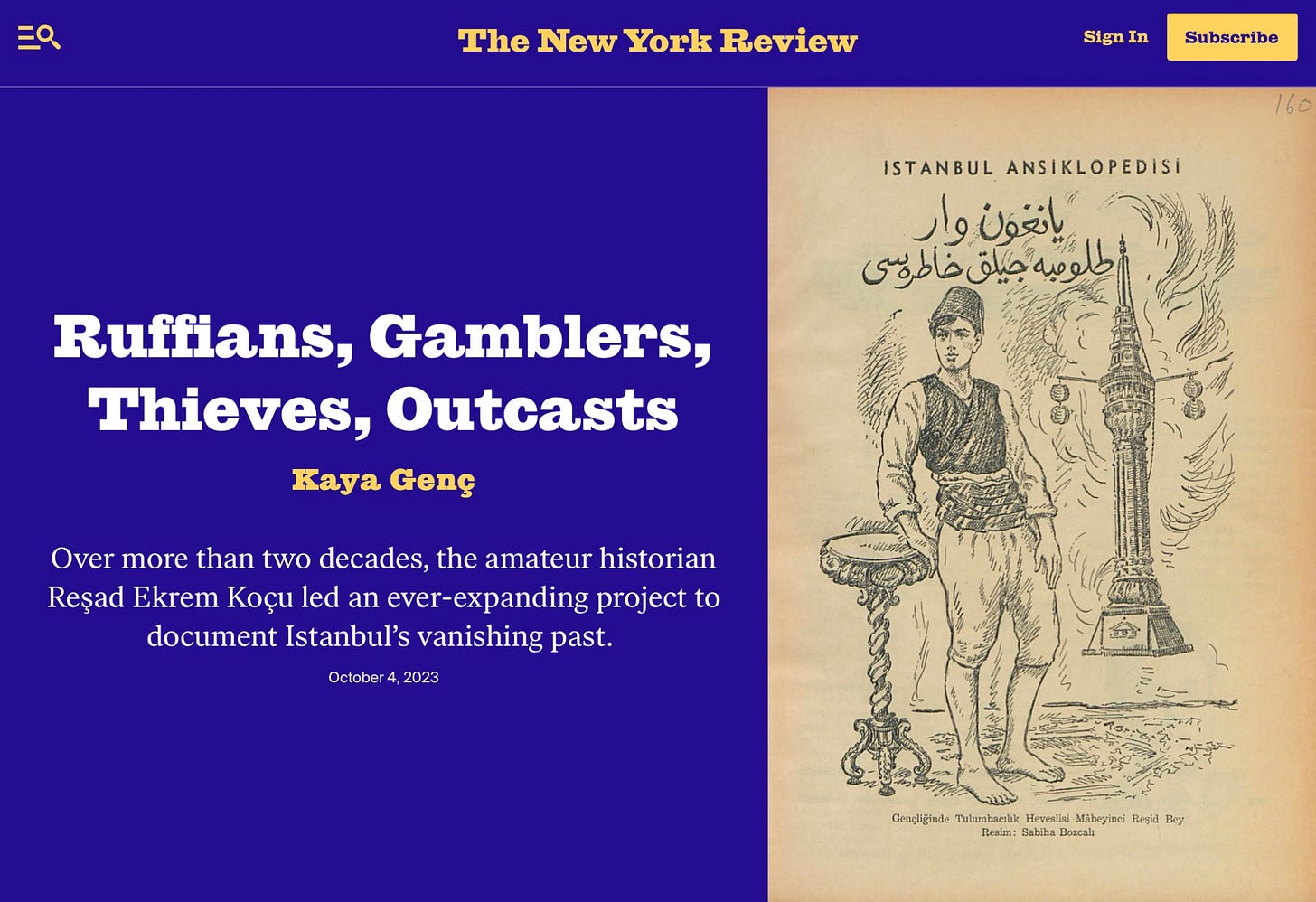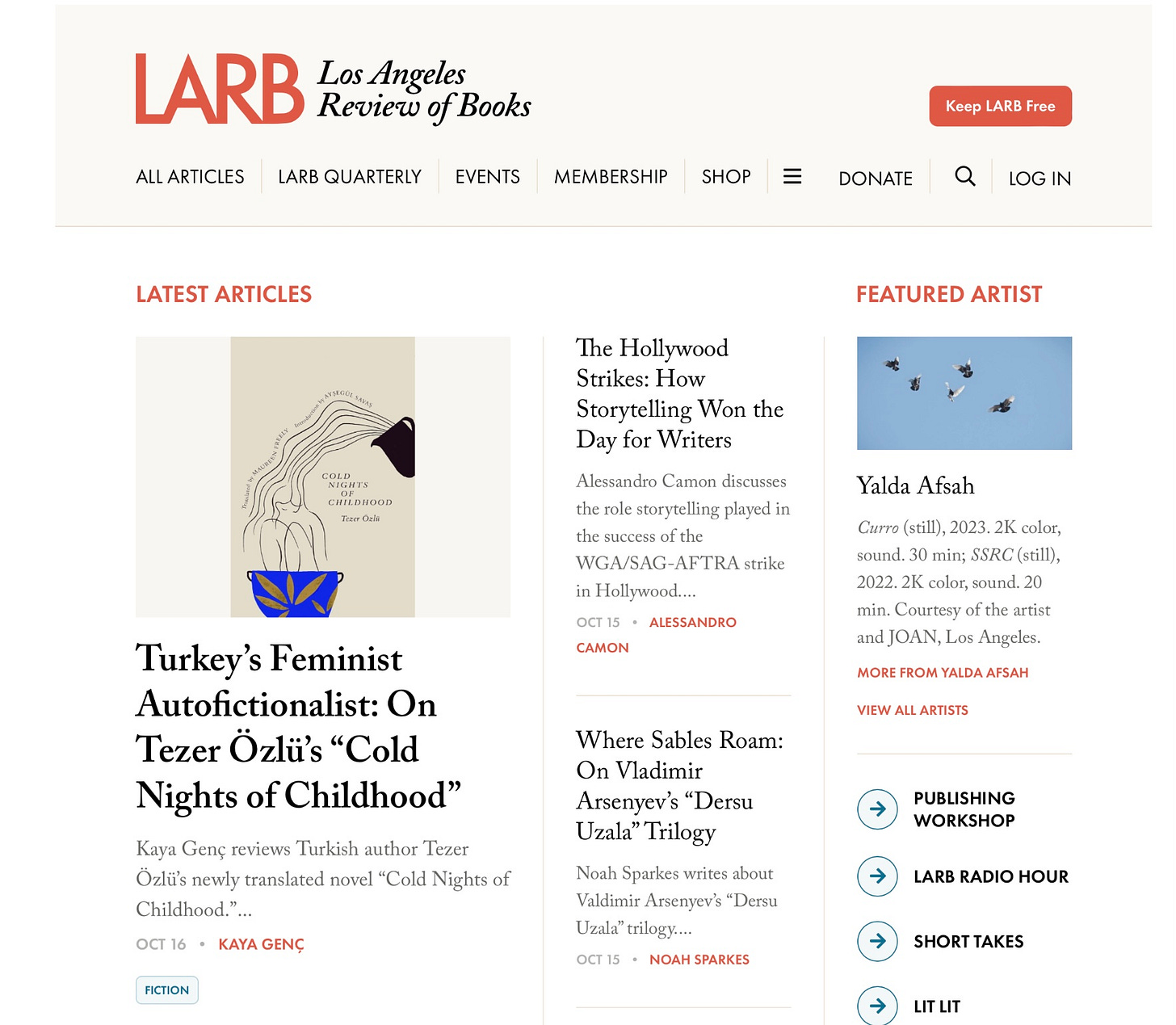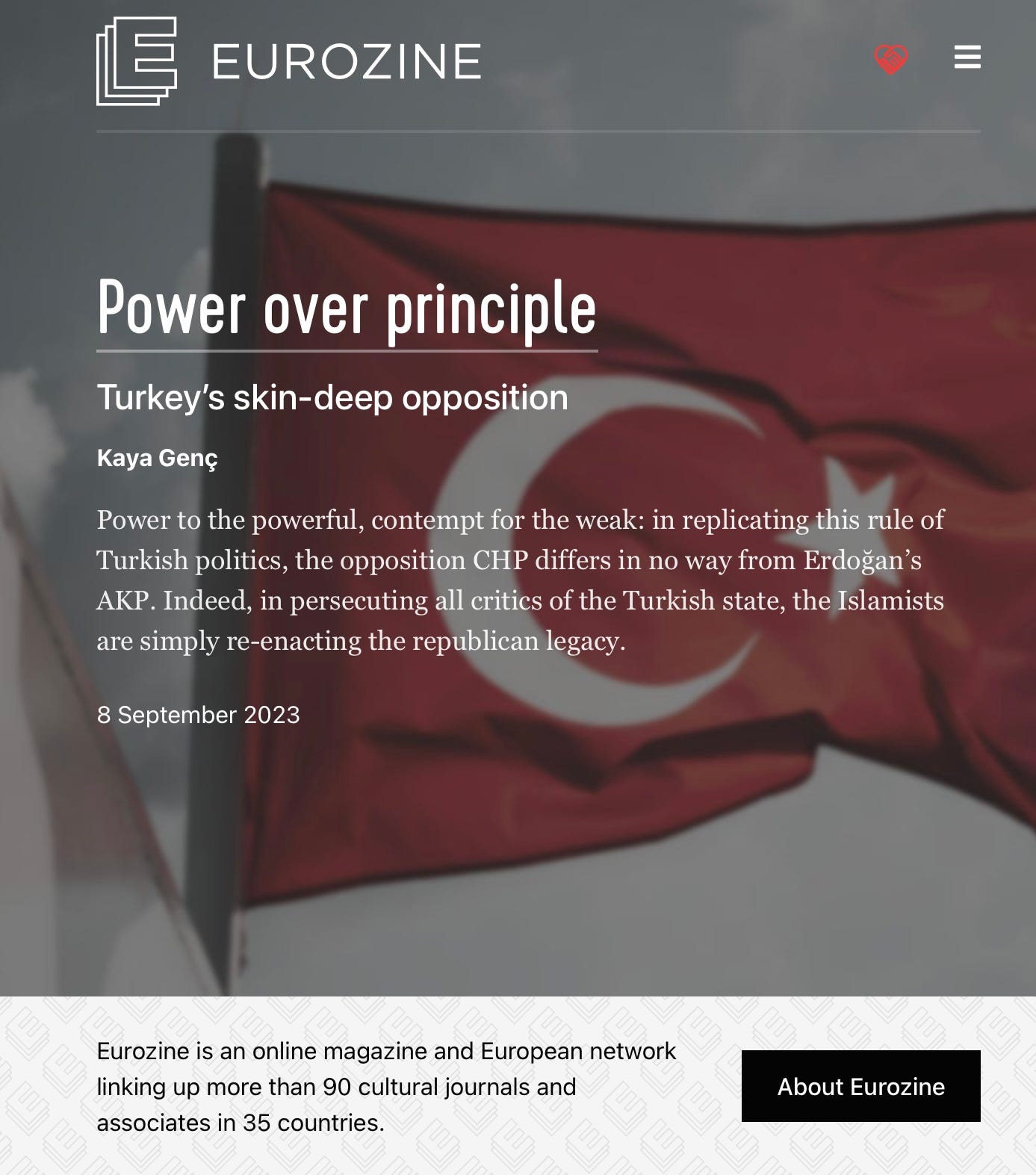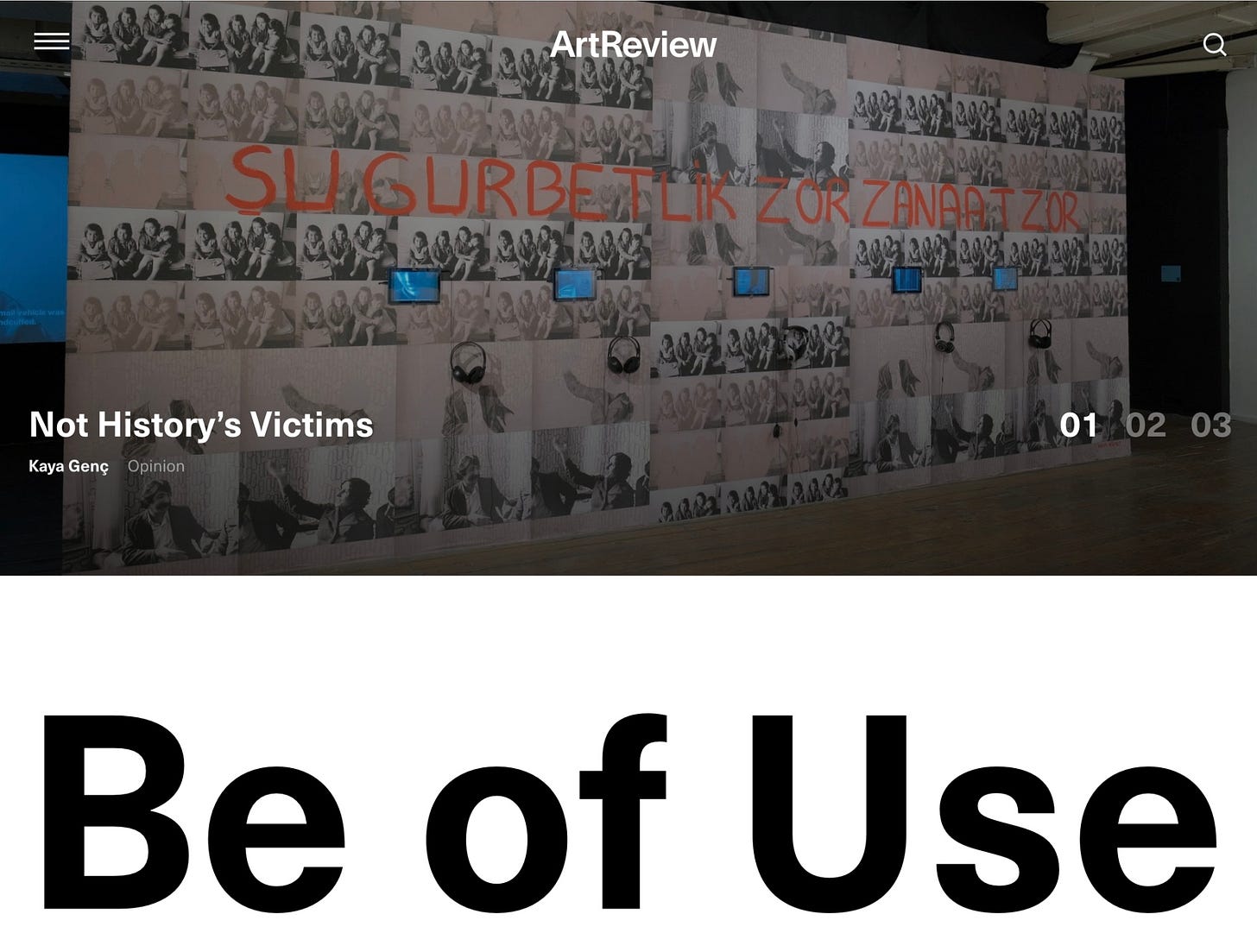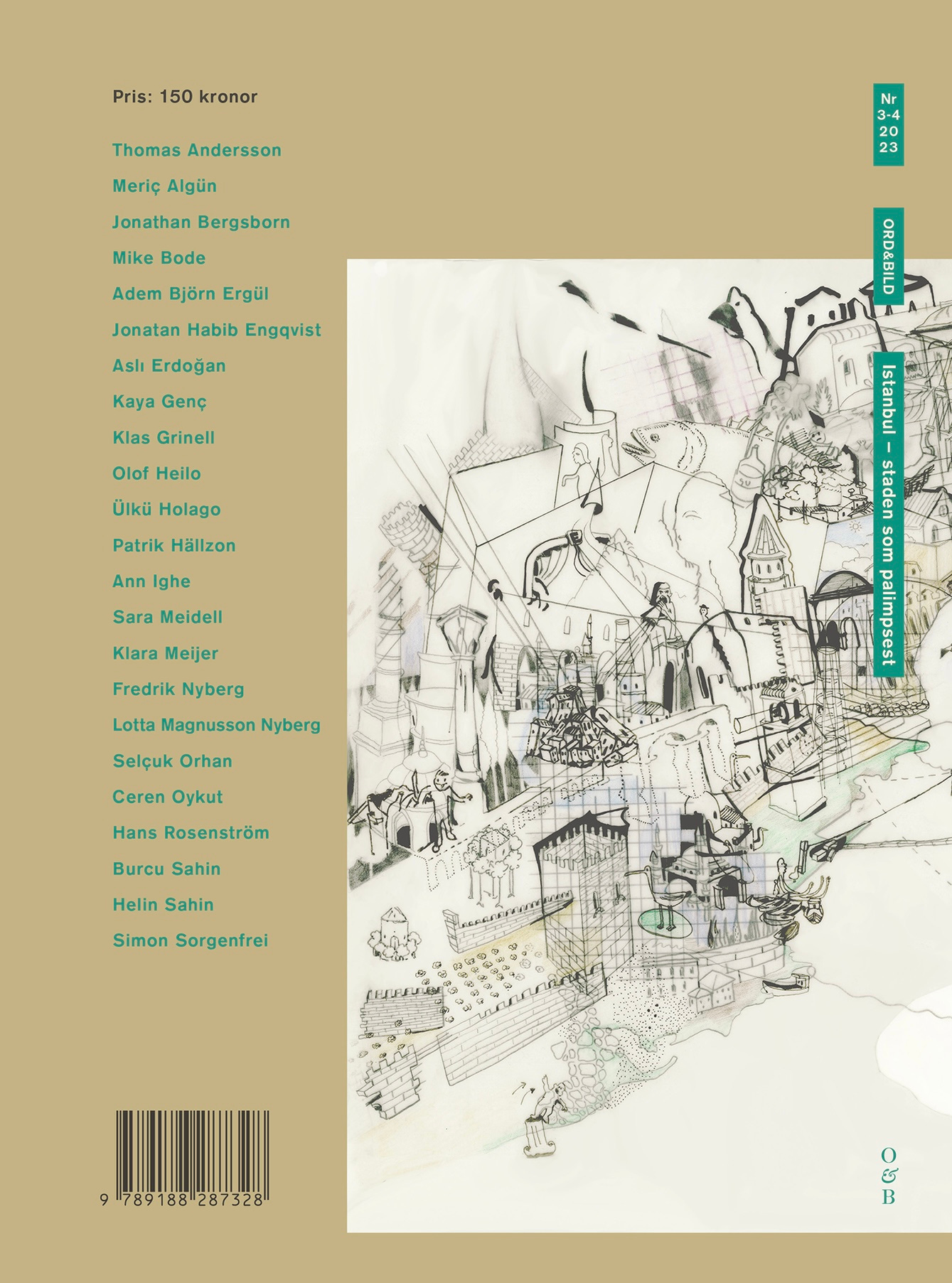Tragedy, Turkish fictions and more
An extended summer spent reading Tezer Özlü and Reşad Ekrem Koçu curtailed by the atrocities of October
These are awful times. Killing campaigns in Israel and Gaza shocked me to the core. The violence traumatised even those watching it from afar. I’ve been reading about the atrocities in the so-called “old media”. I avoided social media where disinformation appears to have peaked (according to the “old media”).
I’ve deleted my social media accounts earlier this year (please read Richard Seymour’s The Twittering Machine), but relapsed quite a few times when I had announcements to share. The underlying mechanisms of these platforms—their feedback loops—are hard to get out of. But get out of them we must. Writers need to get out of them to write better. Readers need to get out of them to think better. In the midst of so much disinformation, it is becoming obvious that everyone needs to get out of them to keep sane.
One great piece I’ve read (again in the “old media”) about the crisis was Arielle Angel’s editorial for Jewish Currents, “We Cannot Cross Until We Carry Each Other”. Also, I heartily recommend The New York Review’s coverage: Sari Bashi, Tareq Baconi, Joshua Leifer, Raja Shehadeh, David Shulman and Fintan O’Toole wrote insightful, striking pieces for the Review on the latest spiral of violence.
Meanwhile violence spread to the culture world, too. Palestine-born novelist Adania Shibli was due to be awarded the 2023 LiBeraturpreis, an annual prize given to female writers from Africa, Asia, Latin America or the Arab world at the Frankfurt Book Fair on 20 October.
But, as Philip Oltermann has reported in The Guardian, the LitProm association, which hands out the prize, recently said it would postpone the ceremony “due to the war started by Hamas, under which millions of people in Israel and Palestine are suffering”. Happily, the good people at Fitzcarraldo Editions have made the eBook of Adania Shibli's MINOR DETAIL, tr. Elisabeth Jaquette, free to download from this link for the entirety of Frankfurt Book Fair (October 18-22). Please read it.
*
Before October 7, I was hard at work reading Turkish fiction in translation. Since I sent my last Substack at the end of August, I published a review of Ebru Ojen’s novel Lojman and polished an essay about İstanbul Ansiklopedisi, a peerless encyclopaedia produced by the eccentric historian Reşad Ekrem Koçu, for The New York Review of Books.
Koçu’s eleven-volume work is a collective endeavour, but it reflects Koçu’s world and character like no other work of his. Koçu wrote historical novels, as well as monographs on various aspects of Ottoman culture. But his most ambitious work of fiction was İstanbul Ansiklopedisi: the monumental work reinvents a city in its own image.
It is difficult to find an author as different from Reşad Ekrem Koçu as Tezer Özlü. I’ve avoided Özlü’s books in my teens and twenties. Yet I fell in love with them in my thirties. As I wrote in a new piece for The Los Angeles Review of Books,
Among novelists whose social-realist and political works dominated Turkey’s literary scene during the 1970s, Tezer Özlü’s voice stood out. Refusing the artifice of the novel form, she wrote diaristically, pouring her heart out to readers. Few other writers of her generation possessed the same skill of inking one’s sensitivities onto paper as nakedly as she did. Cold Nights of Childhood (1980), the second of three books she published in her short lifetime and the only one to appear in English, in an elegant translation by Maureen Freely, is the most distilled articulation of Özlü’s heart. Her diary of falling into despair in Turkey in the early 1970s features a tightly controlled narrative voice. The madness, if that’s the word, in the tale is defined, diagnosed, and dramatized with such clarity that one wonders if an intensely calculating mind invented it. What Cold Nights of Childhood shows is the madness of Turkish society: it’s the tale of how a brave young woman tried to tackle it before ending up in a psychiatric facility.
Sadly, “normal”, “healthy”, “rational” writers have dominated Turkey’s literary scene in the 1970s, pushing the likes of Özlü and Koçu to the margins. Özlü was bipolar and bisexual and spent years in psychiatric institutions; Koçu was a closeted queer novelist in love with beautiful Ottoman men whose adventures he chronicled.
Queerness and mental health problems: in the 1970s, the Turkish regime used these interchangeably to marginalise, institutionalise and silence the most interesting citizens living in the country.
In Cold Nights of Childhood, Özlü describes having her first sexual experiences with women. When Orhan Pamuk wrote about Koçu’s queerness in the early 2000s, there was much grumbling among Turkey’s elderly, conservative, men-dominated intelligentsia: why talk about Koçu’s sexual desire for men, they wondered. But, as I ponder in a new piece for Eurozine,
I’ve long believed that the only way to lead an ethical life in Turkey is by joining the ranks of the ‘deviants’. After all, the political organizations that truly counter the repressive nature of the Turkish state have all been pushed to the margins.
These oppressive mechanisms of the Turkish regime were behind the 12 September 1980 coup military coup, too.
The event traumatised even those who weren’t locked up during the coup, or had relatives or friends who were. It certainly defined me as a teenager. I was born in 1981 and I recall growing an interest in dissidents who were persecuted by the coup from an early age.
A recent visit to Istanbul’s Depo gallery, where I interviewed Aylin Tekiner and Sevim Sancaktar, curators of an exhibition on the coup, was therefore personally illuminating. Earlier this month, I wrote about the legacies of 12 September for ArtReview:
In the course of Turkish history’s most violent military coup, on 12 September 1980, Turkey’s armed forces shut down all political parties and labour unions, suspended the constitution and announced curfews that went on for two years, allowing soldiers to take over all aspects of civilian life. The putschist general Kenan Evren stayed in power until 1989, and under his watch Turkish military officers detained 650,000 people; 517 were condemned to death; 50 were executed by hanging; 171 people died as a result of torture; 43 were claimed to have taken their own lives in captivity. In addition, 30,000 people were exiled from Turkey and 14,000 others lost their citizenship. Turkey’s 1980 coup was especially harsh on the families of its victims. In the intervening 43 years, those relatives became activists struggling for intergenerational memory. In doing so, they are keeping the memory of their loved ones alive and holding thousands of civil and military perpetrators accountable for their crimes. A digital Memory Museum for Historical Justice and the exhibition The Past is Present, on view through November 8 at Istanbul’s Depo gallery comprising artworks and fragments sourced from the museum’s collections, now share these efforts with new publics.
In my piece, I detail the case of the imprisoned arts patron Osman Kavala, who was awarded the Václav Havel Human Rights Prize soon afterward. This was significant, as the show’s curators chose Depo gallery to exhibit the museum’s contents – photographs, letters, banners, magazines and ephemera scattered across the exhibition space – to draw a parallel between Evren’s Turkey in the 1980s and Erdoğan’s ‘New Turkey’ in the 2020s.
A former tobacco warehouse, Depo has served as refuge for critical voices in Istanbul’s cultural landscape since 2008, when it was transformed into its current form by Osman Kavala, a Turkish arts patron. In 2022 Erdoğan called Kavala ‘the red Soros of Turkey’, and accused him of colluding with the philanthropist George Soros, ‘that Hungarian Jew’, to topple him during 2013’s Occupy Gezi protests. A victim of Erdoğan’s fury, Kavala has now spent more than five years in jail, having received a whole life sentence, harsher than those imposed on murderers. Kavala’s shadow falls heavily on The Past is Present, which features a text describing Kavala’s own recollections from the 1980 coup (‘being in prison today feels like the return of cruelty that I have avoided during the coup by sheer chance’, he notes). Depo gallery also hosts Açık Radyo, a dissident radio station; more than any other art space in the city, the building embodies the pressures progressives experience in Turkey through its programme of exhibitions, panels, symposiums and recording sessions, as well as the networks it cultivates.
A victim of Turkish autocracy, Kavala symbolises the dark moment we’re experiencing in Turkey.
Finally, I congratulate Fitzcarraldo Editions in the UK and Transit Books in the US for Jon Fosse’s Nobel win earlier this month. Transit publishes three works from Fosse’s meditative oeuvre, alongside… Özlü’s Cold Nights of Childhood, of course! (I learned from Transit Books yesterday that another Özlü book is in the works.)
I was among those excitedly watching the live feed from the Swedish Academy’s lavish halls to hear the announcement of the prize. The same week, I learned that my “Ode till Marmarasjön” was published in the Istanbul-themed new issue of Ord & Bild, the leading literary magazine of Sweden and one of the oldest cultural magazines of Europe.
My next Substack will land in your inboxes two weeks from today. It will concern the centenary of the Turkish Republic (October 29, 2023). Meanwhile, I’ll be praying for the Gazans and the kidnapped Jewish citizens.
Until next time,
—Kaya







